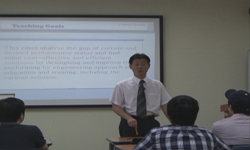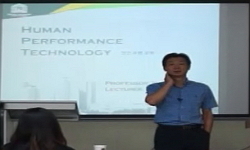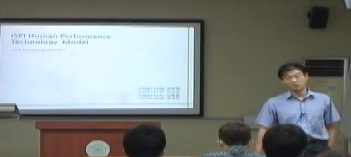배우의 수행을 저해하는 실연 전 긴장은 개체 보존에 유리한 진화의 결과이며, 열역학 제2법칙 즉 엔트로피 증가에 따른 생리현상이다. 다시말해 배우가 인간인 이상 수행 전 긴장은 자연적...
http://chineseinput.net/에서 pinyin(병음)방식으로 중국어를 변환할 수 있습니다.
변환된 중국어를 복사하여 사용하시면 됩니다.
- 中文 을 입력하시려면 zhongwen을 입력하시고 space를누르시면됩니다.
- 北京 을 입력하시려면 beijing을 입력하시고 space를 누르시면 됩니다.

배우의 이완을 위한 기계론적 마음훈련에 관한 연구 = The study on mechanic method of mind training for actor`s relaxation
한글로보기https://www.riss.kr/link?id=A101744225
- 저자
- 발행기관
- 학술지명
- 권호사항
-
발행연도
2015
-
작성언어
Korean
-
주제어
기계론 ; 마음훈련 ; 사이버네틱스 ; 수행 ; 이완 ; cybernetics ; mechanism ; mind training ; performance ; relaxation
-
등재정보
KCI등재
-
자료형태
학술저널
- 발행기관 URL
-
수록면
205-249(45쪽)
-
KCI 피인용횟수
1
- DOI식별코드
- 제공처
- 소장기관
-
0
상세조회 -
0
다운로드
부가정보
국문 초록 (Abstract)
배우의 수행을 저해하는 실연 전 긴장은 개체 보존에 유리한 진화의 결과이며, 열역학 제2법칙 즉 엔트로피 증가에 따른 생리현상이다. 다시말해 배우가 인간인 이상 수행 전 긴장은 자연적인 현상이다. 그러므로 이완의 딜레마란 실연 전 이완이 최상의 수행을 위한 필수의 전제임에도 불구하고 그것이 자연을 거스르는 생리작용이라는 상호모순에서 발생한다. 이러한 이완의 딜레마의 한 해답으로써 본 연구자는 실연 전 긴장을 억제하는 기계론적 마음훈련의 원리와 방법에 대하여 착상하였다. 본 연구는 배우의 말과 짓을 총괄하는 배우의 마음(mind)을 사이버네틱스의 피드백 원리에 기초한 중립, 집중, 고정, 설득의 4단계 훈련을 통하여 유기적(有機的, organic) 상태에서 기계론적(機械論的, Mechanistic) 상태로 전환하여 유전적인 요인과 엔트로피 증가로 인한 긴장의 자생을 억제하는 이완방법론이다. 배우는 본 방법론의 지속적인 실천으로 수행 전 긴장을 억제하고 소통과정을 자동하는 ‘의사소통의 오토마타(automata)’로 진화한다.
다국어 초록 (Multilingual Abstract)
Tension that keeps an actor from performing is actually a result of evolution which is favorable to preservation of individual and natural physiological phenomenon according to the second law of thermodynamics namely an increase in entropy. In other w...
Tension that keeps an actor from performing is actually a result of evolution which is favorable to preservation of individual and natural physiological phenomenon according to the second law of thermodynamics namely an increase in entropy. In other words, it is natural actors to feel tense before performance. Therefore we are facing a dilemma that relaxation before performance is required for the best performance but it is a physiological function that goes against the nature. Author of this paper devised a mechanic method of mind trainng as a solution to abovementioned dilemma that helps control tension before acting by introducing mechanical model based on feedback system of cybernetics to mind training which came from an idea that a tension which an actor feels before acting is natural phenomenon by genetic factor and an increase in entropy. This method helps control tension caused by genetic factor and an increase in entropy by converting actor``s mind that controls actor``s words and acts from organic state to mechanistic one by receiving training which consists of neutrality, concentration, fixation and persuasion based on feedback principle of cybernetics. An actor evolves into ‘automata of communication’ that controls tension before performance and automates communication process by continuously practicing mechanic method of mind trainng.
참고문헌 (Reference)
1 안재범, "자생 과정의 연기론" 한국연극학회 1 (1): 209-252, 2015
2 유병길, "사이버네틱스와 급진적 구성주의에 입각한 학습모형 구안을 위한 예비 작업" 대한지구과학교육학회 3 : 198-208, 2010
3 오진호, "배우의 무대불안극복을 위한 심리적 중재 프로그램 개발 및 고찰" 한국콘텐츠학회 12 (12): 234-243, 2012
4 김형효, "마음혁명" 살림 2007
5 김건, "디드로의 냉정(Sang-froid) 이론에 관한 연구 - <배우에 관한 역설 Paradoxe sur le com?dien>을 중심으로" 프랑스문화예술학회 16 : 23-44, 2006
6 서대원, "뇌 의학의 첫걸음" 우리의학서적 2015
7 김종구, "공연에서 나타나는 '전이'와 배우의 '심리적 경계'에 관한 연구" 한국공연문화학회 5 (5): 57-89, 2012
8 Wiener, Norbert, "cybernetics : Control and Communication in the Animal and the Machine" MIT press 1965
9 Benedetti, Robert., "Zen in art of actor training: Master Teachers of Theatre" Southern Illinois University Press 1988
10 May, Rollo, "The discovery of being : writings in existential psychology" W. W. Norton & Company 1983
1 안재범, "자생 과정의 연기론" 한국연극학회 1 (1): 209-252, 2015
2 유병길, "사이버네틱스와 급진적 구성주의에 입각한 학습모형 구안을 위한 예비 작업" 대한지구과학교육학회 3 : 198-208, 2010
3 오진호, "배우의 무대불안극복을 위한 심리적 중재 프로그램 개발 및 고찰" 한국콘텐츠학회 12 (12): 234-243, 2012
4 김형효, "마음혁명" 살림 2007
5 김건, "디드로의 냉정(Sang-froid) 이론에 관한 연구 - <배우에 관한 역설 Paradoxe sur le com?dien>을 중심으로" 프랑스문화예술학회 16 : 23-44, 2006
6 서대원, "뇌 의학의 첫걸음" 우리의학서적 2015
7 김종구, "공연에서 나타나는 '전이'와 배우의 '심리적 경계'에 관한 연구" 한국공연문화학회 5 (5): 57-89, 2012
8 Wiener, Norbert, "cybernetics : Control and Communication in the Animal and the Machine" MIT press 1965
9 Benedetti, Robert., "Zen in art of actor training: Master Teachers of Theatre" Southern Illinois University Press 1988
10 May, Rollo, "The discovery of being : writings in existential psychology" W. W. Norton & Company 1983
11 Dawkins, Richard, "The Selfish Gene" Oxford Univ Pr 1989
12 Benson, Herbert, "The Relaxaion Response" William Morrow 1975
13 strasberg, lee., "The Lee Strasberg Notes" Routledge 2010
14 Ledoux, Joseph, "Synaptic Self" penguin books 2002
15 Martens, Rainer, "Sports Competition Anxiety Test" Human Kinetics Publishers 1977
16 Jacobson, Edmund, "Progressive relaxion" University of Chicago press 1938
17 Didreot, Denis, "Oewres Esthétiques, Textes établis par Paul Verniére" Garnier 1988
18 Kornfield, Jack, "Meditation for Beginners" Sounds True 2008
19 Pillay, Srinivasan, "Life Unlocked : 7 Revolutionary Lessons to Overcome Fear" Rodale 2010
20 Seligman, Martin, "Learned Helplessness : A Theory for the Age of Personal Control" Oxford University Pr 1993
21 Damasio, Antonio, "LOOKING FOR SPINOZA : Joy, Sorrow And The Feeling" A Harvest Books 2003
22 Austine, John, "How to do Things with Words" Havard UP 1975
23 Buss, David., "Evolutionary psychology : the new science of the mind. 5th ed" Routledge 2015
24 Dispenza, Joe, "Evole Your Brain : The Science of Changing your mind" Health Communication 2007
25 Rifkin, Jeremy, "Entropy : a new world view" THE VIKING PRESS 1980
26 Schultz, J. H., "Autogenic therapy: Vol. 1. Autogenic methods" Grune and Stratton 1969
27 Spielberger, Charls, "Anxiety : Current trends in theory and research" Academic Press 1972
28 Caine, Michael, "Acting in Film : An Actor's Take on Movie Making" Applause 2000
동일학술지(권/호) 다른 논문
-
한국 드라마의 진정성에 대한 고찰 -TV드라마 < 우리 결혼할 수 있을까 >를 중심으로
- 한국연극학회
- 장혜전 ( Hye Jeon Chang )
- 2015
- KCI등재
-
- 한국연극학회
- 남상식 ( Sang Sik Nam )
- 2015
- KCI등재
-
비평담론을 통해 본 연극 < 에쿠우스 > 수용의 쟁점과 에로티시즘
- 한국연극학회
- 김유미 ( Yoo Mi Kim )
- 2015
- KCI등재
-
- 한국연극학회
- 주현식 ( Hyun Shik Ju )
- 2015
- KCI등재
분석정보
인용정보 인용지수 설명보기
학술지 이력
| 연월일 | 이력구분 | 이력상세 | 등재구분 |
|---|---|---|---|
| 2028 | 평가예정 | 재인증평가 신청대상 (재인증) | |
| 2022-01-01 | 평가 | 등재학술지 유지 (재인증) |  |
| 2019-01-01 | 평가 | 등재학술지 선정 (계속평가) |  |
| 2018-12-01 | 평가 | 등재후보로 하락 (계속평가) |  |
| 2015-01-01 | 평가 | 등재학술지 유지 (등재유지) |  |
| 2011-01-01 | 평가 | 등재학술지 유지 (등재유지) |  |
| 2009-01-01 | 평가 | 등재학술지 유지 (등재유지) |  |
| 2007-07-05 | 학술지등록 | 한글명 : 한국연극학외국어명 : Journal of Korean Theatre Studies Association |  |
| 2007-01-01 | 평가 | 등재학술지 유지 (등재유지) |  |
| 2004-01-01 | 평가 | 등재학술지 선정 (등재후보2차) |  |
| 2003-01-01 | 평가 | 등재후보 1차 PASS (등재후보1차) |  |
| 2001-07-01 | 평가 | 등재후보학술지 선정 (신규평가) |  |
학술지 인용정보
| 기준연도 | WOS-KCI 통합IF(2년) | KCIF(2년) | KCIF(3년) |
|---|---|---|---|
| 2016 | 0.34 | 0.34 | 0.38 |
| KCIF(4년) | KCIF(5년) | 중심성지수(3년) | 즉시성지수 |
| 0.36 | 0.34 | 0.825 | 0.04 |





 KCI
KCI KISS
KISS







